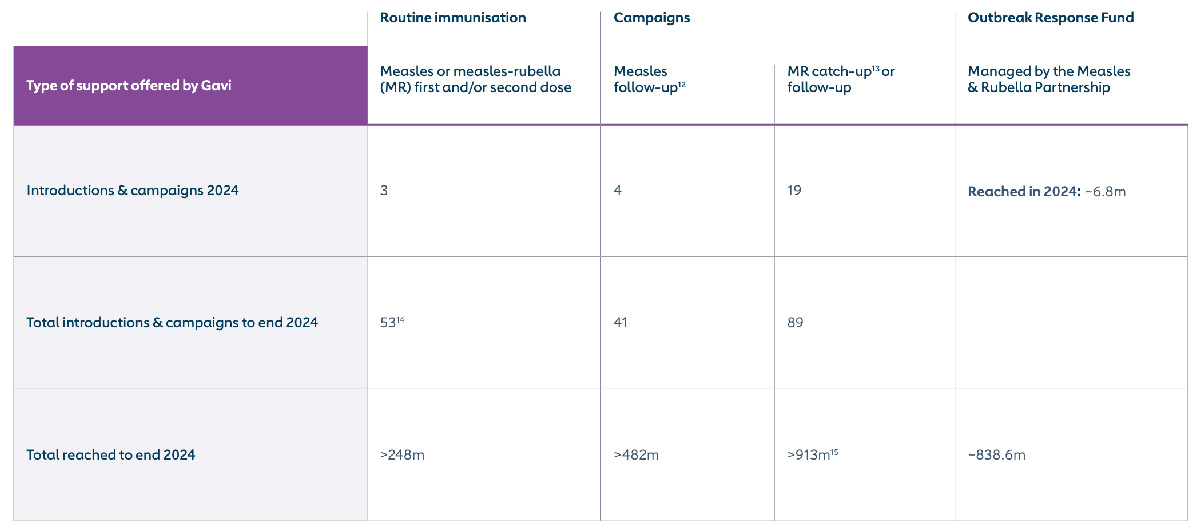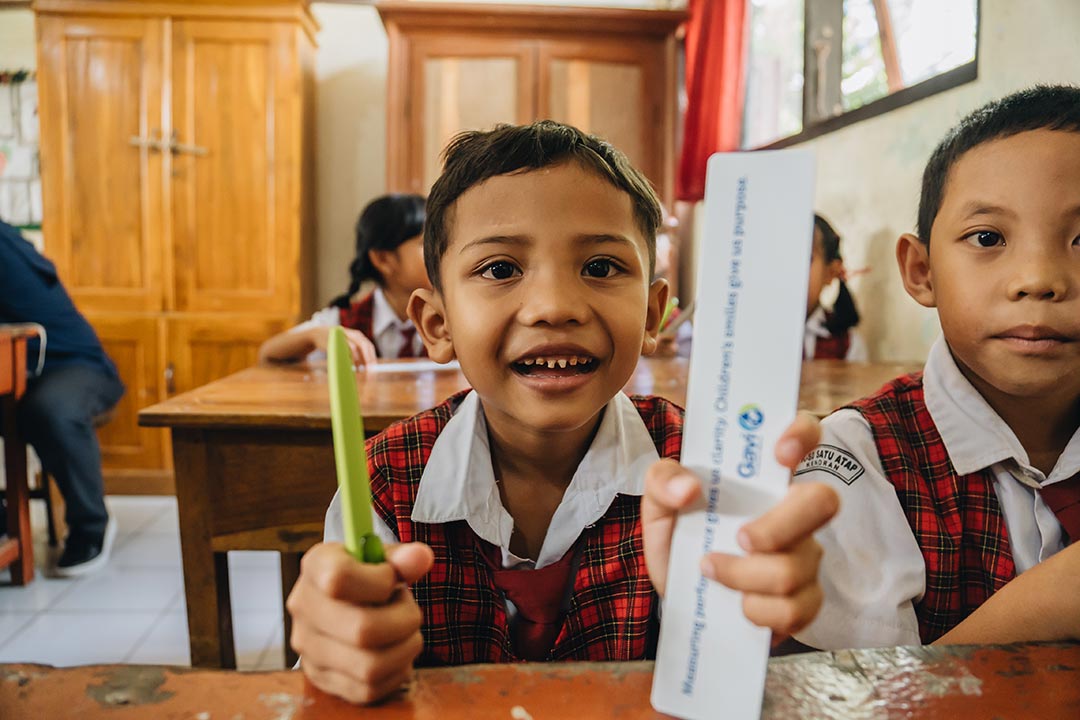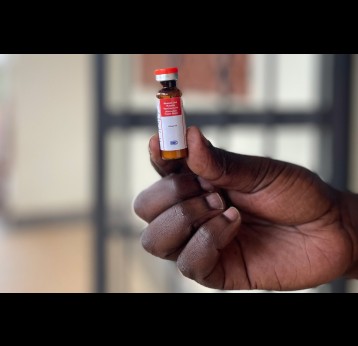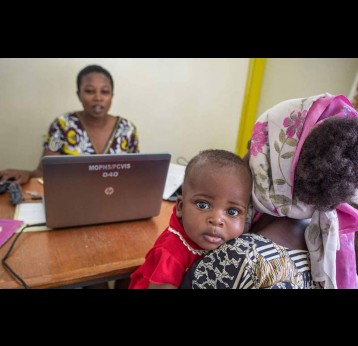Gavi’s impact
In 2024, 23 countries launched measles (M) or measles-rubella (MR) preventive vaccination campaigns. These include 3 wide age-range MR catch-up campaigns at the time of MR introduction and 20 M/MR follow-up campaigns. Out of these, 17 countries conducted a post-campaign coverage survey (PCCS), highlighting that countries achieved on average a coverage rate of 84%.
However, only six of these surveys collected and reported information on the measles zero-dose indicator through the PCCS, with an average of 77% of measles zero-dose children reached during the campaigns. Among the 57 lower-income countries supported by Gavi (Gavi57), coverage of the first dose of measles-containing vaccine (MCV1) saw an increase, improving 2 percentage points from 78% in 2023 to 80% in 2024. Second-dose coverage (MCV2) has risen from 66% in 2023 to 70% in 2024, exceeding the 2024 milestone. This is due to improvements in populous countries such as the Democratic Republic of the Congo (DRC), Uganda and Ethiopia. However, both MCV1 and MCV2 coverage rates are still below the threshold of 95% coverage needed to prevent outbreaks. Given the high transmissibility of the virus and risk for serious outbreaks, continued investment to close immunity gaps – through routine immunisation of at least MCV2 and supplementary preventive campaigns – remains critical.
In 2024, 29 of the Gavi57 countries experienced large or disruptive measles outbreaks. The Outbreak Response Fund, managed by the Measles & Rubella Partnership and funded by Gavi, supported six countries with approximately US$ 11 million to respond to large and disruptive outbreaks in 2024.
The issue
Measles cases have been increasing since 2021 due to COVID-19 pandemic-related disruptions to routine immunisation coverage, reaching an estimated 11 million cases in 2024 (a 30% increase compared to 2022 ). In 2024, 29 of the Gavi57 countries experienced large or disruptive measles outbreaks.
Measles is one of the world’s most contagious human viruses, and it remains one of the top killers of children. Symptoms include high fever and a severe skin rash. Not only does the measles virus's assault on the immune system make the body vulnerable to other bacteria and viruses during the course of the infection, but it can strip away previously acquired immunity to other pathogens, leaving people at higher risk of other diseases, even after they've cleared the measles virus from their systems. Read more here.
Before 2001, more than 750,000 children died annually from measles. Thanks to measles vaccine, global measles deaths have fallen dramatically: in 2024, 94,600 people died of measles – mostly children aged under five years in Gavi-eligible lower-income countries. The measles vaccine has saved more lives than any other vaccine in the past 50 years.
Rubella is another airborne contagious disease caused by a virus. When a woman is infected with rubella virus early in pregnancy, she has a 90% risk of passing the virus on to her foetus. This can cause miscarriage, stillbirth or severe birth defects known as congenital rubella syndrome (CRS). Rubella vaccine is highly effective, yet it is still underused in Africa, where every year more than 100,000 babies are born with CRS. By end 2024, only 13 Gavi-supported countries had not introduced the rubella vaccine into routine immunisation, of which 2 are launching the vaccine by end 2025.
Gavi’s response
Gavi’s measles and rubella strategy aims to achieve coverage of 95% or greater of two doses of measles-containing vaccine – the level needed in each country and community to prevent outbreaks and protect populations.
Gavi supports a first and/or second dose of the measles or MR vaccines. Supporting a second dose of the vaccine provides a second opportunity to reach children who missed the first dose. It also produces immunity in the small number of persons who failed to develop it after the first dose. Gavi also supports measles and MR vaccine follow-up campaigns to address gaps in measles immunity in the population who are not reached through routine immunisation; as well as catch-up campaigns before MR vaccine is introduced into the routine system.
Gavi is the primary funder of immunisation activities in response to measles outbreaks in lower-income countries, through US$ 125 million in contributions to the Measles & Rubella Partnership (M&RP)’s Outbreak Response Fund since 2012.
From other sites
From Gavi's 2024 annual progress report

VaccinesWork articles
How to apply for vaccine support
Latest articles about measles and measles-rubella
View more7 reasons why measles is more dangerous than you think
From hidden immune damage to delayed brain disease, measles carries risks that extend far beyond a childhood rash.
Mauritania: how “desert vaccinators” track outbreaks among the dunes
In Mauritania’s Adrar region, vaccination teams travel hundreds of kilometres across dunes and rocky plains to reach nomadic families constantly on the move.
Measles killed thousands of Ugandan children, and then came the vaccine
“We have come a long way,” says one doctor, as a renewed wave of measles outbreaks threatens Uganda. “We simply cannot go back.”
How to apply for vaccine support
Eligible countries can access detailed guidelines to manage the support they receive from Gavi.





